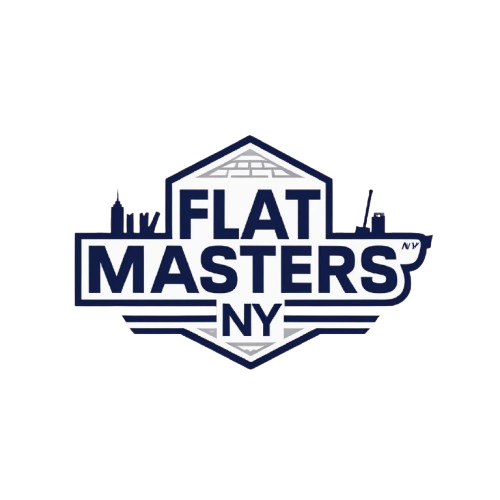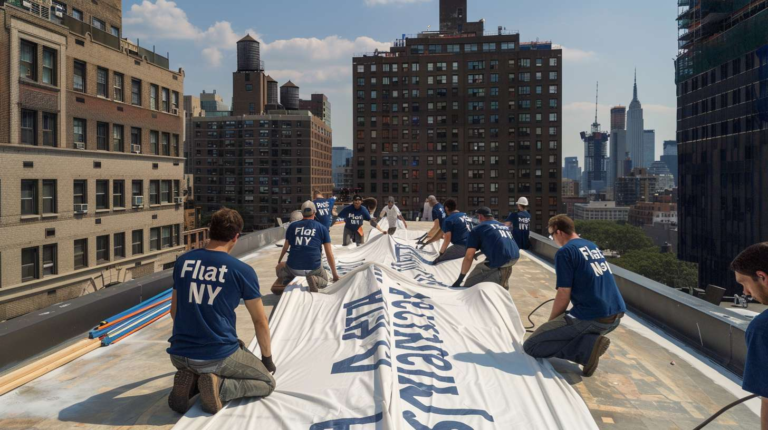Professional Flat Roof Fascia Board Products & Installation
When it comes to flat roof fascia boards in Queens, you're looking at material costs ranging from $8-25 per linear foot, plus installation running another $12-18 per foot depending on the complexity of your building. But here's the thing - fascia board selection can make or break your flat roof system, especially with our weather patterns coming off the East River.
I've been installing flat roof fascia boards across Queens for over two decades now, from the high-rises in Long Island City to the row houses in Astoria, and I can tell you that most property owners don't realize how critical these components are until water starts finding its way behind their walls.
Understanding Flat Roof Fascia Board Function
A fascia board on flat roof systems serves as the finishing edge that covers the exposed rafter tails and provides a mounting surface for gutters. Unlike pitched roofs where fascia boards are primarily aesthetic, flat roof fascia boards must handle significant structural loads and moisture management responsibilities.
The flat roof fascia board creates that crucial transition between your roof membrane and the building's exterior walls. Without proper fascia board installation, you're basically inviting water infiltration, pest problems, and thermal bridging issues that'll cost you thousands down the road.
Last month we replaced fascia boards on a 4-story building on 31st Avenue where the previous contractor had used standard lumber instead of proper flat roof materials. The moisture damage extended three feet into the interior walls by the time they called us.
Material Options for Flat Roof Fascia Boards
When selecting fascia board for flat roof applications, you've got several material choices, each with distinct performance characteristics and cost implications.
Aluminum Fascia Boards
Aluminum remains the most popular choice for flat roof fascia boards in Queens. We typically use .032" or .040" gauge aluminum coil stock, formed on-site to exact specifications. Cost runs about $12-18 per linear foot installed, and the material holds up incredibly well against our salt air and temperature swings.
The beauty of aluminum flat roof fascia boards is the custom fabrication capability. My crew can form complex profiles right on your rooftop, ensuring perfect fit around HVAC penetrations, parapet walls, and architectural details.
Galvanized Steel Fascia Systems
For buildings requiring higher structural capacity, galvanized steel fascia boards offer superior strength. Material costs run higher - usually $15-22 per linear foot - but the longevity justifies the investment on commercial properties.
Steel flat roof fascia boards work particularly well on buildings over 6 stories where wind loads become significant. We installed steel fascia on a 12-story building in Elmhurst last year, and the structural engineer specifically required the additional strength for wind resistance.
Composite and PVC Options
Synthetic fascia board materials have improved dramatically over the past decade. High-density PVC and composite flat roof fascia boards offer excellent moisture resistance and dimensional stability, though they cost more upfront - typically $18-28 per linear foot installed.
The main advantage? Zero maintenance. These materials won't rot, warp, or require periodic painting like traditional lumber products.
Installation Considerations for Queens Properties
Installing fascia boards on flat roofs requires specific techniques adapted to our local building conditions and weather patterns. The process isn't just about attaching boards - it's about creating an integrated water management system.
First consideration is the existing roof structure. Many Queens buildings built before 1980 have parapet walls that complicate fascia installation. We often need to create custom flashing details where the fascia board meets existing masonry.
Proper slope and drainage integration is critical. Flat roof fascia boards must direct water toward scuppers or internal drains, not create pockets where moisture can accumulate. I can't tell you how many times we've corrected installations where contractors ignored drainage patterns.
Here's something most property owners don't realize - the fascia board attachment method varies significantly based on your building's structural system. Concrete block buildings require different fastening than steel-framed structures, and using the wrong approach leads to premature failure.
Flashing and Waterproofing Details
The connection between flat roof fascia boards and your roof membrane represents the most vulnerable point in the entire system. This is where proper flashing becomes absolutely essential.
We use a multi-layer approach: base flashing adhered directly to the roof membrane, counter-flashing secured to the fascia board, and a continuous seal between all components. The flashing material must be compatible with your roof membrane - you can't mix EPDM with TPO flashings, for example.
On buildings with existing built-up roof systems, we typically install a cant strip behind the fascia to eliminate the sharp 90-degree angle that causes membrane stress. This detail adds about $8 per linear foot but prevents the cracking that leads to leaks.
Temperature movement is huge in Queens. Summer temperatures can reach 140°F on dark roof surfaces, while winter brings sub-zero conditions. Your flat roof fascia board system must accommodate this expansion and contraction without compromising the waterproof seal.
Common Problems and Solutions
After installing thousands of linear feet of flat roof fascia boards across Queens, certain problems show up repeatedly. Understanding these issues helps property owners make better material and contractor choices.
Ice dam formation tops the list. When fascia boards aren't properly insulated from the interior space, heat transfer creates melting and refreezing cycles. We solve this with thermal breaks and proper insulation detailing, though it adds complexity to the installation.
Fastener failure comes second. Standard screws and nails don't handle the stress cycles in flat roof applications. We use structural fasteners with EPDM washers, spaced according to wind load calculations specific to your building height and exposure.
Look, I don't care what other contractors tell you about "quick fixes" for failing fascia boards. Proper repairs require removing sections of roof membrane, addressing any structural damage, and reinstalling the entire assembly. Anything less is temporary at best.
Maintenance and Longevity
Properly installed flat roof fascia boards should last 25-30 years with minimal maintenance, but that assumes quality materials and correct installation techniques.
Annual inspections are essential. We check fastener tightness, flashing integrity, and drainage function every fall before winter weather arrives. Small issues caught early cost hundreds to fix; ignored problems become thousand-dollar emergencies.
The salt air from Flushing Bay and the East River accelerates corrosion on metal fascia systems. Buildings within 5 miles of the water need more frequent inspection and may require premium coating systems for maximum longevity.
Gutter attachment points deserve special attention. The additional weight and stress from gutters and downspouts can loosen fascia board connections over time. We reinforce these mounting areas during initial installation to prevent future problems.
Cost Factors and Budget Planning
Several factors influence the total cost of flat roof fascia board installation beyond basic material and labor rates.
Building height significantly impacts pricing. Work above three stories requires additional safety equipment and longer installation times. Figure an extra $3-5 per linear foot for buildings over 60 feet.
Existing condition matters enormously. If we're replacing rotted wood fascia, there's usually structural damage requiring repair before new installation. These repairs can double the project cost but are absolutely necessary for long-term performance.
Architectural complexity drives labor costs. Simple straight runs install quickly, but buildings with multiple rooftop levels, HVAC equipment, and penetrations require custom fabrication that increases both material and labor expenses.
Permit requirements in Queens vary by building type and scope of work. Most fascia replacement projects require permits, adding $200-800 to your total cost depending on the building department review process.
At Flat Masters NY, we provide detailed estimates that break down all cost components so property owners understand exactly what they're paying for. No surprises, no hidden charges - just honest pricing based on the actual work required.
When you're ready to discuss your flat roof fascia board needs, give us a call. We'll assess your building's specific requirements and provide recommendations based on our extensive experience with Queens properties. Your building deserves fascia boards that'll perform reliably for decades, and we know how to deliver that level of quality.


